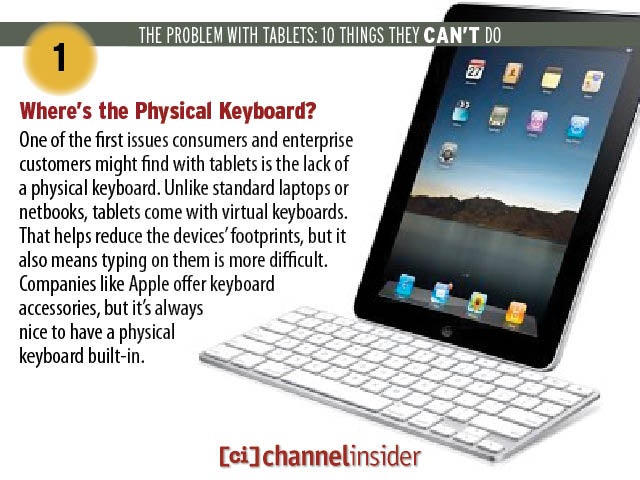 The Problem with Tablets 10 Things They Cant Do
The Problem with Tablets 10 Things They Cant Do
1. Where’s the Physical Keyboard?One of the first issues consumers and enterprise customers might find with tablets is the lack of a physical keyboard. Unlike standard laptops or netbooks, tablets come with virtual keyboards. That helps reduce the devices’ footprints, but it also means typing on them is more difficult. Companies like Apple offer keyboard accessories, but it’s always nice to have a physical keyboard built-in.
 No Title
No Title
2. Windows 7 Isn’t UsefulFor years now, Microsoft has been touting its ability to deliver a worthwhile experience on tablets with the help of Windows 7. The only issue is, Windows 7 is far less appealing in the tablet space than Microsoft would like folks to believe. Plus, the operating system is designed for desktops and notebooks with mice and keyboards, not tablets that require touch screens. Those looking for Windows 7 on tablets won’t like what they find.
 No Title
No Title
3. There’s No Mac OS XThere are millions of people around the globe that prefer to use Mac OS X, Apple’s desktop-based operating system. The only issue is, Apple won’t be offering that operating system on tablets. So, those who are seeking out that platform on their tablets won’t be in luck. Instead, they will need to opt for iOS, an operating system that lacks much of the functionality customers will find on the desktop.
 No Title
No Title
4. Printing Is Too DifficultAlthough Apple has delivered AirPrint, a platform that lets users print wirelessly from the iPad, there are few printers that actually support the functionality. And in most cases, the feature could be a bit easier to use. Elsewhere in the tablet space, printing is practically impossible. That’s a problem. And those who are in a pinch and need to quickly print out a document will find more to like on traditional computers than tablets.
 No Title
No Title
5. Where Have All the Corporate Programs Gone?The enterprise will find several applications in mobile marketplaces that will allow them to extend the functionality of their tablets. However, the applications that they most often rely upon are typically only available on Windows. And considering the iPad runs iOS and devices like the Motorola Xoom run Android, those programs won’t be available to them on tablets. If mission-critical applications are required for some companies, tablets might not be the best bet.
 No Title
No Title
6. Powerful Multimedia EditingWith the announcement of the iPad 2, Apple also told those in attendance at its press event that iMovie and GarageBand would be available in iOS 4.3, the operating system running on the iPad. The only issue is, iMovie isn’t exactly a full-featured video-editing platform. And for the most part, those who need more powerful options won’t find much to like. The same can be said across other tablets. Simply put, more powerful functions aren’t so easily performed on tablets.
 No Title
No Title
7. Buying Decisions Are DifferentWhen it comes to buying PCs, the sheer number of options available to customers is difficult to sift through. So many companies offer customization options that choosing the right configuration takes time. But all those options also help to tailor the experience to the user. And along the way, it typically makes for a happier user. But tablets are different. The options available to customers are usually limited to wireless networking and storage. Beyond that, customers will find the exact same device (from a component perspective) from any vendor. That’s unfortunate.
 No Title
No Title
8. Keep It For YearsWhen a consumer and especially an enterprise customer buys a computer, they expect it to last for at least five years. They get every last dime out of their investment. But tablets aren’t designed for that. Apple releases a new iPad every year. And chances are, its competitors will too. That doesn’t mean consumers will need to buy a new tablet every year, but given how substantial the annual updates are, most folks will likely be forced to buy a tablet every couple years at least. Those on a budget won’t be happy to hear that.
 No Title
No Title
9. Rely On It to Be ProductiveTablets are fine devices for those who want to be entertained while they’re on-the-go. And even those folks that have some work to do on the plane or away from the office will be able to do just that with a tablet. But tablets still pale in comparison to notebooks. Those devices run full operating systems, offer physical keyboards, and generally deliver an experience that people are a bit more familiar with. So, if top-level productivity is what users are after, tablets shouldn’t be relied upon.
 No Title
No Title
10. Replace Your ComputerThere are some in the tablet market that believe they can replace their home computers with a device like the iPad or Motorola Xoom. Yes, tablets are quite functional. And the devices can easily replace a netbook or lightweight notebook. But they don’t stand the chance against a full-fledged laptop or desktop. Those devices do too much and offer too much power for tablets to replace them. And it’s important for consumers to keep that in mind.

